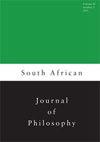No justice, no progress: Contemporary African leadership and society in Plato’s crucible
IF 0.3
3区 哲学
0 PHILOSOPHY
引用次数: 0
Abstract
Virtue and vice, courage and cowardice, wisdom and folly are tendencies common to all humans without historical, geographical, colour, or gender exceptions. Granting that the aforesaid statement is tenable, this article engages Plato’s idea of a just city and a just soul in the Republic and considers how these might speak to contemporary African leadership deficits and societal ills. This appraisal is predicated upon the notion that a just city and a just soul or their approximation are attainable and worth pursuing in contemporary Africa. Thus, as answers are sought for the colonial legacies still haunting Africa, self-examination is necessarily part of the process. In the Wretched of the Earth for example, it is easy and maybe legitimately so, to focus on Franz Fanon’s fiery critique of the colonialists and miss his self-critical appraisal of African intellectuals and leaders whom he calls “[s]poiled children of yesterday’s colonialism and today’s governing powers” that “oversee the looting of the few national resources”. More than fifty years after colonialism, this critique still remains valid. I therefore explore Plato’s answers (or questions) to this age-old human crisis of self- and public governance currently amplified in Africa and hampering common good and progress. In the search for a just city characterised by common good, this article spotlights Nigeria to buttress Plato’s emphasis on state of the soul rather than class, colour or creed as a precursor to leading a just and eudaemonic life and good self- and public governance.没有正义,就没有进步:柏拉图坩埚中的当代非洲领导和社会
美德与邪恶,勇敢与怯懦,智慧与愚蠢是所有人类共有的趋势,没有历史、地域、肤色或性别的例外。承认上述说法是站得住脚的,本文将柏拉图关于《理想国》中正义之城和正义之魂的观点纳入其中,并考虑这些观点如何与当代非洲领导人的缺陷和社会弊病联系起来。这种评价是基于这样一种观念,即一个公正的城市和一个公正的灵魂或它们的近似是可以实现的,值得在当代非洲追求。因此,在为仍然困扰非洲的殖民遗留问题寻求答案时,自我反省是这一进程的必要组成部分。例如,在《悲惨的地球》一书中,人们很容易关注弗朗茨·法农对殖民主义者的激烈批评,而忽略了他对非洲知识分子和领导人的自我批评,他称这些人是“昨天殖民主义和今天的统治力量的被宠坏的孩子”,他们“监督着对少数国家资源的掠夺”。殖民主义结束50多年后,这一批评仍然有效。因此,我探索柏拉图对这个古老的人类自我和公共治理危机的答案(或问题),目前在非洲被放大,阻碍了共同的利益和进步。在寻找一个以共同利益为特征的公正城市的过程中,本文聚焦尼日利亚,以支持柏拉图对灵魂状态的强调,而不是阶级,肤色或信仰,作为领导公正和幸福生活以及良好的自我和公共治理的先驱。
本文章由计算机程序翻译,如有差异,请以英文原文为准。
求助全文
约1分钟内获得全文
求助全文
来源期刊

SOUTH AFRICAN JOURNAL OF PHILOSOPHY
PHILOSOPHY-
CiteScore
1.00
自引率
0.00%
发文量
19
期刊介绍:
The South African Journal of Philosophy (SAJP) is the official publication of the Philosophical Society of South Africa. The aim of the journal is to publish original scholarly contributions in all areas of philosophy at an international standard. Contributions are double-blind peer-reviewed and include articles, discussions of articles previously published, review articles and book reviews. The wide scope of the South African Journal of Philosophy makes it the continent''s central vehicle for the publication of general philosophical work. The journal is accredited with the South African Department of Higher Education and Training.
 求助内容:
求助内容: 应助结果提醒方式:
应助结果提醒方式:


